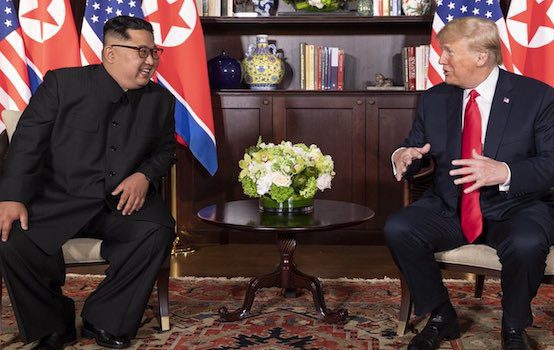The Many Failures of ‘Maximum Pressure’

The Financial Times reports on the failed “maximum pressure” campaign on Iran and the heightened risk of war that it has created. This section stood out because it showed how deluded administration officials are about both North Korea and Iran:
The US official responded that Iran was to blame for the lack of high-level engagement, saying its leaders had not been willing to follow in the same steps as North Korean dictator Kim Jong Un [bold mine-DL]. “It would be my hope that at some point the Iranian regime decides to take advantage of that opportunity for dialogue, but they’re not there yet.”
It should go without saying that there is no “opportunity for dialogue” when our government is relentlessly strangling their economy, designating part of their military as a terrorist organization, and threatening them with additional punitive measures. The Iranian government doesn’t want to engage with the Trump administration because they see no point in doing so, and they have every incentive not to. Considering how inflexible and unreasonable the administration has been in its dealings with North Korea, the Iranian government would reasonably conclude that talking to the U.S. is a waste of time. If Trump’s reneging on the nuclear deal was a warning to North Korea that the U.S. can’t be trusted, the administration’s fruitless “diplomacy” with Pyongyang tells the Iranian government that talking to Trump gets you nothing.
The official’s comparison with North Korea is telling, and it tells us a lot about why the administration’s policies toward both countries have failed. Trump and his officials apparently think that North Korea’s willingness to negotiate was a result of “maximum pressure,” but this is clearly not the case. North Korea was willing to talk to Trump because they had already completed enough of their nuclear weapons and missile testing to be confident in their deterrent, and they knew that it was their nuclear weapons and missile programs that gave them leverage in any talks with the U.S. North Korea isn’t going to give up anything just because of pressure, and they didn’t agree to talk because of pressure. There has to be some positive inducement offered, but to date the Trump administration refuses to make a serious offer with respect to sanctions relief. “Maximum pressure” has, in fact, achieved nothing constructive in any of the three cases where it has been used by this administration, and it has only added to the economic hardship suffered by the population.
Iran is in a very different position from North Korea, because they made the mistake of trusting the U.S. to honor our side of the agreement and gave up the leverage they had prior to 2015. Iran’s government understandably has no desire to talk to the government that just betrayed them, and they have little leverage that they could use in negotiations in any case. Iran’s slow reduction in complying with some of the terms of the JCPOA has been forced on them by the “maximum pressure” campaign, and they are doing this to show that there are limits to how much punishment they will absorb before they stop fulfilling all of their nuclear deal commitments. The administration has never been interested in Iran’s compliance, but has been looking for every means available to force them to abandon the deal so they can have a pretext for conflict.
“Maximum pressure” didn’t bring North Korea to the table, so there is no reason to expect that it would force Iran to talk. North Korea previously made the strategic choice to become a nuclear weapons state, and that has put them in a much better position to resist U.S. demands and pressure. The message that the Trump administration is sending to the world is that nuclear weapons proliferators will be treated with a measure of respect and engaged as equals while states that choose to abide by their nonproliferation commitments will be ruthlessly punished for reasons that have nothing to do with their nuclear program. You could not come up with a more perverse and harmful set of incentives if you tried.
The reason for the failure of “maximum pressure” is straightforward: ever-increasing pressure provokes resistance and struggle from the targeted state. When someone starts strangling you, the normal reaction is to fight back. It is not to ask the strangler what he would like in exchange for an end to the strangulation. The same hawks that support the pressure campaigns would be the first to oppose making any concessions under external pressure, but they can’t or won’t understand that people in other countries would have the same response. Hard-liners that want to compel other states to capitulate are arrogant enough to think that other nations don’t have the same national pride, self-respect, and desire for security that we have, and they are cruel enough not to care about the tens of millions of people that their coercive policies harm in the meantime.
Comments